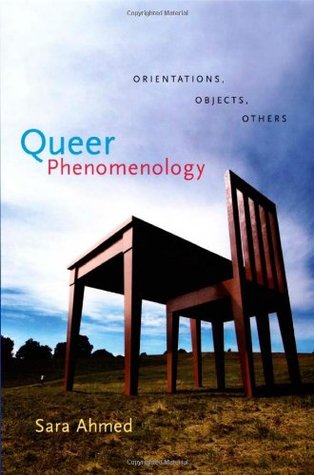This recommendation comes from another college friend, although I still haven’t seen him in person in several years. He was one of my RAs when I was an Assistant Resident Director, my senior year. We reconnected on the phone when I was on my Roadtrip last year. We also talked very recently while I was in Denver. Both times, I was reminded of the intellectual quandaries I would discuss with him during my formative college years.
Recommendation #8 from Aaron Long
Queer Phenomenology by Sara Ahmed

First published in 2006, “Sara Ahmed demonstrates how queer studies can put phenomenology to productive use. Focusing on the “orientation” aspect of “sexual orientation” and the “orient” in “orientalism,” Ahmed examines what it means for bodies to be situated in space and time. Bodies take shape as they move through the world directing themselves toward or away from objects and others. Being “orientated” means feeling at home, knowing where one stands, or having certain objects within reach. Orientations affect what is proximate to the body or what can be reached. A queer phenomenology, Ahmed contends, reveals how social relations are arranged spatially, how queerness disrupts and reorders these relations by not following the accepted paths, and how a politics of disorientation puts other objects within reach, those that might, at first glance, seem awry.” (goodreads.com)
It wasn’t the easiest read on my list, but I really appreciated how Sara Ahmed presented her thoughts as a different, more nuanced way to understand terms like “straight”, “orientation”, and “co-incidence”. And with 48 notes made throughout the book, there’s plenty for me to reconsider and ponder more.
“In order to become orientated, you might suppose that we must first experience Disorientation. When we are orientated, we might not even notice that we are orientated; we might not even think “to think” about this point. When we experience disorientation, we might notice orientation as something we do not have. After all, concepts often reveal themselves as things to think “with” when they fail to be translated into being or action.”
That’s just from the introduction. So you can see why it took me several months to read this recommendation. But, even though it required hardwork, dedication, and persistence, I’m very glad I stuck it out.
“Comfort is a feeling that tends not to be consciously felt, as I suggest above. Instead, you sink. When you don’t sink, when you fidget and move around, then what is in the background becomes in front of you, as a world that is gathered in a specific way. Discomfort, in other words, allows things to move. Every experience I have had of pleasure and excitement about a world opening up has begun with such ordinary feelings of discomfort of not quite fitting in a chair, of becoming unseated, of being left holding onto the ground.”
So much of the past year has been uncomfortable. Conversations labeling me as confrontational, angry, or threatening have continued. Phone calls, emails, and messages that I sent haven’t received responses. I’ve lived in all sorts of “homes”, and have even lived with my parents the past 2 months. But, I appreciate all that the past 12 months has brought into my life. I’ve experienced adventure, a sense of freedom, and new people, places, and experiences. I’ve healed from my divorce, my parents have come to a new, more accepting understanding of my sexuality. And I am about to departing to Denver in less than one week to truly start a new chapter of my life.
A Queer Phenomenology
“A queer phenomenology would involve an orientation toward queer, a way of inhabiting the world by giving “support” to those whose lives and loves make them appear oblique, strange, and out of place. Queer gatherings, where the objects we face “slip away” are disorientating. For me, the table is just such a supporting device for queer gatherings, which makes the table itself a rather queer device. It is hence not surprising that a queer phenomenology, one that is orientated toward the queer, will be full of tables. It is also not surprising that such tables will be full–inhabited by those who in gathering around have already made a rather queer impression.
Of course when tables are mentioned, I think about The Last Supper. It was a time where Jesus showed that the act of sharing a meal, sharing life, brings people together. That everyone, no matter how queer or even traitorous, is still welcome. And in my mind, I’m sure that Jesus has a queer phenomenology himself, and is constantly inviting us to tables to dine.
The song tied to this post is a preview for next month’s Redemption playlist (May 11th). I discovered it in the Evergreen Starbucks. It talks about staying young as a child, staying wild, and never getting old. That Jesus said we should approach heaven like little children once again resonates with this song that we are often too serious, too unimaginative, and too disbelieving to fully appreciate the mystery of life.